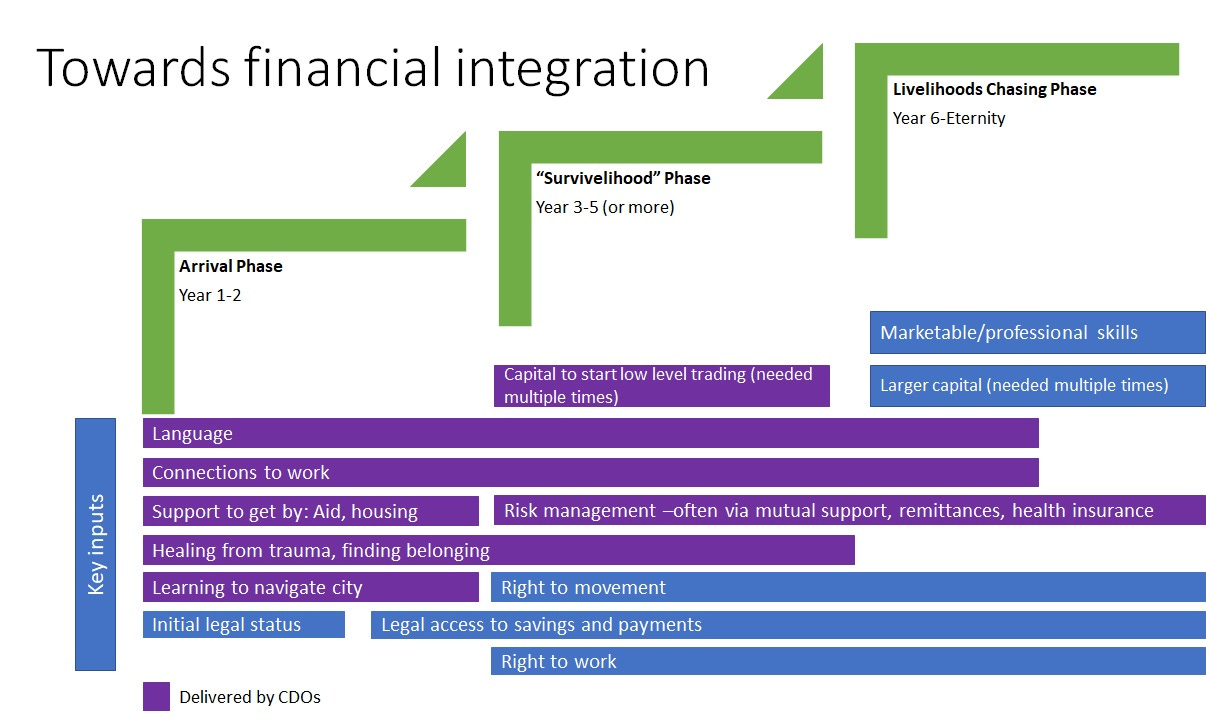
Following where Community-Driven Organizations Lead
Lessons for strengthening refugee financial integration
In this issue of Fresh FINDings we feature research from Kenya, led by Julie Zollmann in collaboration with Cate Wanjala. Please visit the Journeys Project at Tufts University for previous studies, ongoing research, videos, maps, and artwork on refugees and migrants in the Middle East and Mediterranean, Latin America, and Africa.
Following where Community-Driven Organizations Lead
By Julie Zollmann
In November, our Kenya research team wrapped up our final round of interviews with our sample of 73 urban refugees in Nairobi. Over the course of three rounds of discussions, we heard a lot about the key people and organizations that help refugees build and sustain financial lives in the city. We heard about experiences with UNHCR, large international NGOs, local Kenyan-run NGOs, and, most of all, about religious institutions and a small, refugee-led organization, Kintsugi. Together, these community-driven organizations (CDOs) were able to reach a large share of refugees and make a lasting impact, even with limited funding pooled from member contributions.
We set out to better understand three of these organizations by speaking with their leadership, members, and beneficiaries. We wanted to know what role they play in complementing the more formal aid infrastructure. What lessons and possibilities do they offer the wider refugee support community?
In this new essay, Following Where Community-Driven Organizations Lead, we reflect on what we learned. Throughout the project, we have seen that getting to financial health requires many financial and non-financial inputs. For example, one is likely unable to earn enough money to cover basic needs without some foundational inputs such as safe housing, learning the language, legal status, and some start-up capital and market connections (Figure 1).

Figure 1: Moving towards financial integration requires financial and non-financial inputs.
CDOs offer many of these services to members through personalized support, counseling, and mentorship. They do so in ways that are often more accessible than the more formal support institutions, and they do so through personal connection, bonding over a shared experience of displacement and recovery. They take the emotional burdens and needs of displaced people seriously, which is also key to helping people start over economically and financially. In a stricter financial sense, they often help provide acute survival assistance, risk management, and start-up capital for small trading businesses. They recognize that for refugees in Nairobi, whose survival is precarious and uncertain, building financial health is not a linear process. There are many times when refugees will face setbacks and need to start over again—and again. They accompany members in that long, uncertain journey.
Many of these organizations could do even more to support refugees’ financial health. Embedded in refugee communities, they see the service gaps. Their commitments and accessibility position them well to fill many of these gaps, particularly around language learning, local integration, and counseling. If they had the right human resources and more meaningful partnerships with other players, they could help lead the way to assist the UNHCR and NGOs to improve the accessibility and quality of their services, serving as advisors and board members. These organizations raise the bar for dignified, impactful service, and refugee support more broadly would be significantly improved by following where they lead.
Fresh FINDings is made possible through a partnership among Tufts University, the Katholische Universität Eichstätt – Ingolstadt (Catholic University or KU), the International Rescue Committee and GIZ. Fresh FINDings also features work sponsored by Catholic Relief Services, Mercy Corps, and the International Organization for Migration.
Contact: Kimberley.Wilson@tufts.edu
For more see Journeys Project
